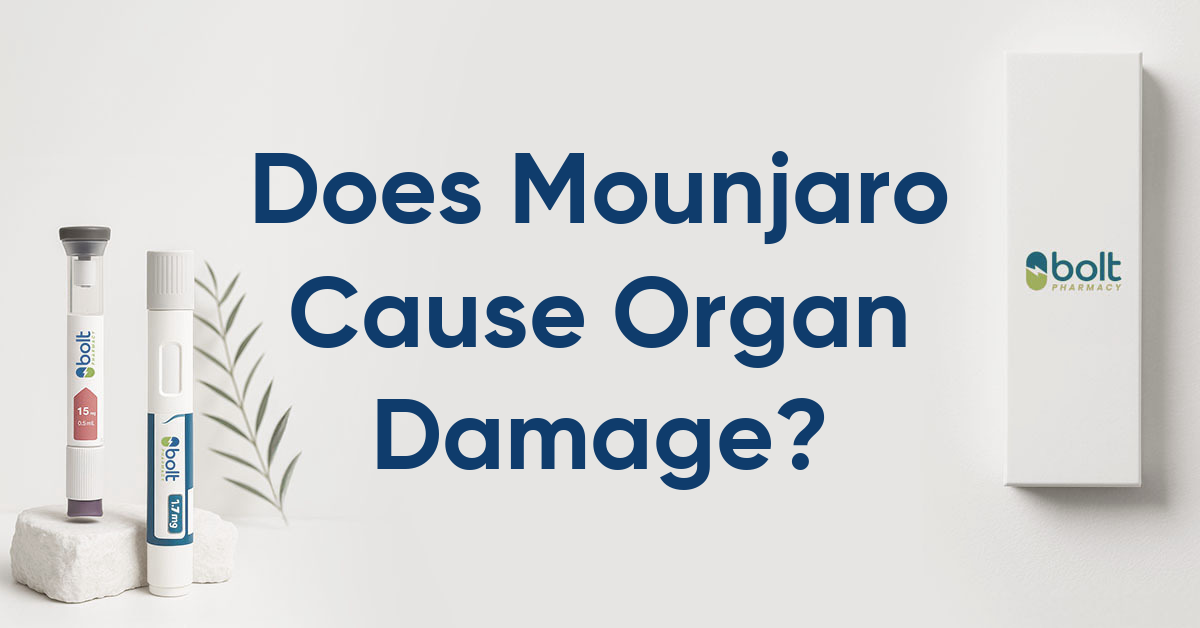Mounjaro (tirzepatide) is a dual GIP and GLP-1 receptor agonist licensed in the UK for type 2 diabetes and weight management. As with any medication, patients and clinicians naturally ask: does Mounjaro cause organ damage? Current evidence does not establish that Mounjaro directly causes widespread organ damage when used as prescribed. However, like all medicines, it carries potential risks that require careful monitoring. Understanding these risks, recognising warning symptoms, and maintaining regular clinical review are essential for safe use. This article examines the evidence on Mounjaro's safety profile, potential organ-related concerns, and guidance on monitoring and seeking medical advice.
Summary: There is no established evidence that Mounjaro (tirzepatide) directly causes widespread organ damage in the general population when used as prescribed under medical supervision.
- Mounjaro is a dual GIP and GLP-1 receptor agonist licensed for type 2 diabetes and weight management in adults
- Potential serious risks include pancreatitis, gallbladder disease, acute kidney injury from dehydration, and hypoglycaemia when combined with certain diabetes medications
- Animal studies showed thyroid C-cell tumours in rodents, but human relevance remains uncertain; patients should report neck masses or difficulty swallowing
- Regular monitoring of renal function, blood glucose, weight, and symptoms is essential during treatment
- Seek urgent medical attention for severe persistent abdominal pain, signs of dehydration, hypoglycaemia, visual changes, or allergic reactions
- The MHRA and EMA continue to monitor safety data; adverse effects should be reported via the Yellow Card scheme
Table of Contents
What Is Mounjaro and How Does It Work?
Mounjaro (tirzepatide) is a prescription medicine licensed in the UK for the treatment of type 2 diabetes mellitus and, more recently, for weight management in adults with obesity (BMI ≥30 kg/m²) or overweight (BMI ≥27 kg/m²) with at least one weight-related comorbidity, as an adjunct to a reduced-calorie diet and increased physical activity. It belongs to a novel class of medications known as dual glucose-dependent insulinotropic polypeptide (GIP) and glucagon-like peptide-1 (GLP-1) receptor agonists. This dual mechanism distinguishes Mounjaro from other GLP-1 receptor agonists such as semaglutide.
The drug works by mimicking the action of two naturally occurring incretin hormones. GLP-1 enhances insulin secretion in response to food intake, suppresses glucagon release (which reduces glucose production by the liver), slows gastric emptying, and promotes satiety. GIP also stimulates insulin secretion and may influence fat metabolism and energy balance. By activating both pathways simultaneously, tirzepatide has been shown in clinical trials (SURPASS for diabetes and SURMOUNT for weight management) to improve glycaemic control and facilitate weight loss.
Mounjaro is administered as a once-weekly subcutaneous injection, typically starting at a low dose (2.5 mg) and gradually titrated upwards to minimise gastrointestinal side effects. The maintenance dose varies depending on individual response and tolerability, with maximum doses reaching 15 mg weekly. It is important to note that Mounjaro is not insulin and should not be used in people with type 1 diabetes or for the treatment of diabetic ketoacidosis. It is not indicated for use in people under 18 years of age. As with all prescription medications, it should only be used under the supervision of a qualified healthcare professional who can assess suitability and monitor for adverse effects.
Potential Risks and Side Effects of Mounjaro
Like all medicines, Mounjaro can cause side effects, although not everyone experiences them. The most commonly reported adverse effects are gastrointestinal, including nausea, vomiting, diarrhoea, constipation, abdominal pain, and reduced appetite. Other common side effects include fatigue and injection-site reactions (such as redness or itching). These symptoms are usually mild to moderate, occur predominantly during dose escalation, and tend to diminish over time as the body adjusts to the medication.
More serious, though less common, risks have been identified in clinical trials and post-marketing surveillance. Pancreatitis (inflammation of the pancreas) has been reported with GLP-1 receptor agonists, and patients should be advised to seek immediate medical attention if they experience severe, persistent abdominal pain that may radiate to the back, often accompanied by vomiting. If pancreatitis is suspected, tirzepatide should be stopped immediately and not restarted if pancreatitis is confirmed. There is also a potential risk of gallbladder disease, including cholelithiasis (gallstones) and cholecystitis, particularly in individuals experiencing rapid weight loss.
Regarding organ damage specifically, there is no established evidence that Mounjaro directly causes widespread organ damage in the general population when used as prescribed. However, the Medicines and Healthcare products Regulatory Agency (MHRA) and the European Medicines Agency (EMA) continue to monitor safety data. In animal studies, tirzepatide was associated with thyroid C-cell tumours in rodents, but the relevance to humans remains uncertain. As a precaution, patients should be advised to report symptoms such as a neck mass, difficulty swallowing, or persistent hoarseness.
Other important considerations include the risk of hypoglycaemia (low blood sugar) when Mounjaro is used in combination with insulin or sulfonylureas, acute kidney injury (particularly in patients who become dehydrated from gastrointestinal side effects), and diabetic retinopathy complications in people with pre-existing eye disease. Caution is advised in patients with severe gastrointestinal disease, including severe gastroparesis. Mounjaro is not recommended during pregnancy or breastfeeding, and it may reduce the effectiveness of oral contraceptives. Patients should be counselled about recognising symptoms and the importance of adequate hydration.

Monitoring Your Health While Taking Mounjaro
Regular monitoring is essential to ensure the safe and effective use of Mounjaro. Before starting treatment, your healthcare provider will conduct a thorough assessment, including your medical history, current medications, and baseline measurements such as HbA1c (a marker of long-term blood glucose control), body weight, renal function (estimated glomerular filtration rate, or eGFR), and liver function tests.
Once treatment begins, ongoing monitoring should include:
-
Blood glucose levels: Particularly important if you are taking other diabetes medications that may increase hypoglycaemia risk. Self-monitoring may be advised, and adjustments to concomitant therapy (such as insulin or sulfonylureas) may be necessary.
-
Renal function: Periodic checks of kidney function are recommended, especially if you experience significant gastrointestinal side effects that could lead to dehydration. No dose adjustment is required in renal impairment (including end-stage renal disease), but closer monitoring is advised if significant gastrointestinal adverse effects occur.
-
Weight and metabolic parameters: Regular weight measurements help assess treatment response. Your clinician may also monitor blood pressure, lipid profile, and liver enzymes as part of comprehensive cardiovascular risk management.
-
Symptoms of pancreatitis or gallbladder disease: Be vigilant for new or worsening abdominal pain, and report this promptly to your GP or diabetes specialist nurse. Routine monitoring of pancreatic enzymes (amylase/lipase) is not required unless symptoms suggest pancreatitis.
-
Contraception: If you are of childbearing potential, discuss contraception with your healthcare provider. Tirzepatide may reduce the effectiveness of oral contraceptives; consider using a barrier or non-oral method for 4 weeks after starting treatment and after each dose increase. If planning pregnancy, discuss this with your prescriber, as it is generally advised to stop tirzepatide at least 1 month before a planned pregnancy.
According to NICE guidance, people with type 2 diabetes should have structured follow-up at least annually, with more frequent reviews during treatment initiation or dose adjustments. If Mounjaro is prescribed for weight management, regular clinical review (typically every 3–6 months) is recommended to evaluate efficacy, tolerability, and the need for continued therapy, in line with local commissioning arrangements. Patients should maintain open communication with their healthcare team and attend all scheduled appointments to optimise safety and therapeutic outcomes.
When to Seek Medical Advice About Mounjaro
While many side effects of Mounjaro are mild and self-limiting, certain symptoms warrant urgent medical attention. You should:
Call 999 or go to A&E immediately if you experience:
- Signs of a severe allergic reaction (anaphylaxis), such as swelling of the face, lips, tongue or throat, severe rash, difficulty breathing, or feeling faint
Contact your GP or call NHS 111 urgently if you experience:
-
Severe, persistent abdominal pain (especially if radiating to the back and accompanied by vomiting), which may indicate pancreatitis. Stop taking tirzepatide immediately and do not restart without medical advice.
-
Symptoms of dehydration due to prolonged vomiting or diarrhoea, including reduced urination, dark urine, dizziness, or confusion.
-
Symptoms of hypoglycaemia (if taking other diabetes medications), such as sweating, trembling, confusion, rapid heartbeat, or loss of consciousness.
-
Visual changes or eye pain, particularly if you have a history of diabetic retinopathy.
-
Symptoms suggestive of gallbladder problems, including right upper abdominal pain, fever, or jaundice (yellowing of the skin or eyes).
-
New neck swelling, difficulty swallowing, or persistent hoarseness, which could potentially relate to thyroid issues.
You should also arrange a routine appointment with your healthcare provider if you experience persistent nausea or vomiting that interferes with eating or taking other medications, unexplained weight loss beyond expected therapeutic effect, persistent injection-site reactions, or any new symptoms that concern you.
It is important not to stop Mounjaro abruptly without medical advice, as this may affect your diabetes control or weight management goals. If you are considering discontinuing treatment due to side effects, discuss this with your prescriber, who can advise on dose adjustment, symptomatic management, or alternative therapies.
If you suspect you have experienced a side effect from Mounjaro, you can report this through the MHRA Yellow Card scheme (yellowcard.mhra.gov.uk or via the Yellow Card app). Remember, the benefits of Mounjaro in improving glycaemic control and facilitating weight loss must always be balanced against potential risks, and this assessment should be made collaboratively with your healthcare team based on your individual circumstances and response to treatment.
Frequently Asked Questions
Can Mounjaro damage your kidneys?
Mounjaro does not directly damage kidneys, but acute kidney injury can occur if severe gastrointestinal side effects (vomiting, diarrhoea) lead to dehydration. Regular monitoring of renal function and maintaining adequate hydration are important, especially during dose escalation.
Does Mounjaro increase the risk of pancreatitis?
Pancreatitis has been reported with GLP-1 receptor agonists, including Mounjaro, though it remains uncommon. Patients should seek immediate medical attention for severe, persistent abdominal pain radiating to the back, and tirzepatide should be stopped if pancreatitis is suspected.
What organs should be monitored while taking Mounjaro?
Regular monitoring should include kidney function (eGFR), liver function tests, pancreatic symptoms (abdominal pain), gallbladder symptoms, blood glucose levels, and diabetic retinopathy screening in those with pre-existing eye disease. Your healthcare provider will determine the appropriate monitoring schedule based on your individual circumstances.
The health-related content published on this site is based on credible scientific sources and is periodically reviewed to ensure accuracy and relevance. Although we aim to reflect the most current medical knowledge, the material is meant for general education and awareness only.
The information on this site is not a substitute for professional medical advice. For any health concerns, please speak with a qualified medical professional. By using this information, you acknowledge responsibility for any decisions made and understand we are not liable for any consequences that may result.
Heading 1
Heading 2
Heading 3
Heading 4
Heading 5
Heading 6
Lorem ipsum dolor sit amet, consectetur adipiscing elit, sed do eiusmod tempor incididunt ut labore et dolore magna aliqua. Ut enim ad minim veniam, quis nostrud exercitation ullamco laboris nisi ut aliquip ex ea commodo consequat. Duis aute irure dolor in reprehenderit in voluptate velit esse cillum dolore eu fugiat nulla pariatur.
Block quote
Ordered list
- Item 1
- Item 2
- Item 3
Unordered list
- Item A
- Item B
- Item C
Bold text
Emphasis
Superscript
Subscript










